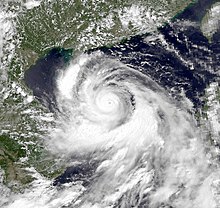 Typhoon Dot approaching Hainan Island on June 9 | |
| Meteorological history | |
|---|---|
| Formed | June 4, 1989 |
| Dissipated | June 12, 1989 |
| Typhoon | |
| 10-minute sustained (JMA) | |
| Highest winds | 150 km/h (90 mph) |
| Lowest pressure | 955 hPa (mbar); 28.20 inHg |
| Category 3-equivalent typhoon | |
| 1-minute sustained (SSHWS/JTWC) | |
| Highest winds | 185 km/h (115 mph) |
| Overall effects | |
| Fatalities | 8 |
| Missing | 1 |
| Damage | $45.1 million (1989 USD) |
| Areas affected | Philippines, Hong Kong, China, Vietnam |
| IBTrACS | |
Part of the 1989 Pacific typhoon season | |
Typhoon Dot, known in the Philippines as Typhoon Kuring, was one of several tropical cyclones to impact southern China and northern Vietnam during the 1989 Pacific typhoon season. Originating from a tropical disturbance near Palau on June 4, Dot tracked west-northwestward towards the Philippines. Crossing the country on June 6, the system moved over the South China Sea and attained typhoon status. Late on June 8, Dot reached its peak intensity with winds estimated at 185 km/h (115 mph). The system weakened slightly the next day before making landfall in Hainan Island. A weakened storm then entered the Gulf of Tonkin before striking northern Vietnam and dissipating on June 12.
Throughout its course, Typhoon Dot produced heavy rains in the Philippines, China and Vietnam, resulting in significant damage and eight fatalities. The most severe impacts took place on Hainan Island where 1,400 homes were destroyed and another 60,000 were damaged. In Vietnam, Dot exacerbated flooding triggered in late May by Tropical Storm Cecil.